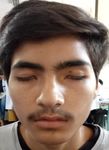Bilateral Facial Nerve Palsy: A Rare Presentation - International Journal of Health ...
←
→
Page content transcription
If your browser does not render page correctly, please read the page content below
International Journal of Health Sciences and Research
Vol.11; Issue: 1; January 2021
Website: www.ijhsr.org
Case Report ISSN: 2249-9571
Bilateral Facial Nerve Palsy: A Rare Presentation
Vishal Singh1, Dinesh Sharma2
1
ENT Department Civil Hospital Baijnath, Kangra.
2
ENT Department IGMC Shimla.
Corresponding Author: Dinesh Sharma
ABSTRACT
Introduction- Bilateral facial paralysis is a rare condition. It may manifest either simultaneous or
alternating form and it represents the .3-2% patients of all cases of facial nerve palsy. Majority of
these cases have some underlying medical condition. Bell’s palsy accounts for only 23% of bilateral
facial paralysis.
Case report-A young male patient of 18 yrs presented in ENT OPD with history of difficulty in
chewing, impaired facial movements, incomplete eye closure bilaterally. Haematology, serum
biochemistry, chest x-ray, MRI brain were normal.
Discussion- There may be some serious underlying disease responsible for bilateral facial nerve
palsy. However etiology may be congenital, traumatic, infectious, neurological, metabolic, neoplastic,
toxic, vascular, and idiopathic. A complete head neck and neurological examination should be done.
Conclusion- Bilateral facial palsy is a rare condition and it may present as alternative or simultaneous
bilaterally. Careful history and detailed examination is to be done. It’s very important to consider all
the possible differential diagnosis, to perform relevant lab. And radiological Investigations to reach up
to the underlying etiology. However prognosis is good.
Keywords: Bilateral facial paralysis, Bell’s palsy, facial palsy.
INRODUCTION Simultaneous onset is defined as the
Unilateral facial nerve palsy is a involvement of the opposite side within 30
common neurological condition with an days of the onset of the first side. We are
incident of 25 cases per 100,000 populations presenting young male patient of age 18 yrs
and it mimics stroke. 70% of these cases are as a case of bilateral facial nerve palsy with
idiopathic also known as Bell’s palsy. [1] simultaneous appearance.
Bilateral facial paralysis is a rare condition.
It may manifest either simultaneous or CASE REPORT
alternating form and it occurs in .3-2% An 18 yrs old male patient presented
patients of all cases of facial nerve palsy. in ENT OPD with history of difficulty in
The differential diagnosis of bilateral facial chewing and inability to closure of bilateral
paralysis includes congenital, traumatic, eyes with full effort from five days. No
neurologic, infectious, metabolic, history of pyrexia, trauma to head,
neoplastic, toxic, iatrogenic and idiopathic headache, nausea, vomiting, impaired vision
etiologies. Incidence is 1 in 50,00,000 was positive. No history of ear discharge,
population.[2,3] Majority of these cases have tinnitus, giddiness. No history blood
some underlying medical condition. Unlike transfusion, or sexual promiscuity.
the unilateral presentation, it is seldom On examination the patient was in
secondary to Bell's palsy. Adour found only no distress. His temperature was 98.61F,
3 bilateral cases in a consecutive series of pulse 80 bpm, respiratory rate 16/min, and
1,000 patients with Bell's palsy.[4] blood pressure 114/76 mm Hg. The head,
International Journal of Health Sciences and Research (www.ijhsr.org) 257
Vol.11; Issue: 1; January 2021Vishal Singh et.al. Bilateral facial nerve palsy: a rare presentation.
eyes, ears, nose, and throat were all normal. examination was within normal limits. No
The neck was supple, with a midline cerebellar signs were positive.
trachea. There was no thyromegaly, parotid Chest X-ray and spinal X-rays were
gland enlargement, lymphadenopathy, or reported to be normal. Patient refused
mucosal rugosities. Auscultation of the heart lumbar puncture and CSF examination.
and lungs was normal. The abdomen was Serum biochemistry was unremarkable.
soft and nontender, without organomegaly, Serological tests for various agents,
bowel sounds were normal. Local including thyroid peroxidase antibodies,
examination was suggestive of bilateral antinuclear antibody, anti neutrophil
facial nerve palsy (lower motor neuron cytoplasmic antibody, syphilis antibody,
type). Mild slurring of speech was positive. lyme (Borrelia) IgM, were all negative. MRI
Other cranial nerves were within normal brain was normal. Diagnosis of
limits. Power was normal in all limbs, deep Fig 1-3 On presentation, grade-4 bilateral
tendon reflexes were present, sensory facial nerve palsy ‘house brackmen
classification.’
Fig-1 Fig-2 Fig-3
Fig-4 to 6, grade-2 bilateral facial nerve palsy ‘house brackmen classification’ 3
weeks after initial presentation.
Fig-4 Fig-5 Fig-6
Bilateral facial nerve palsy with and was kept on follow up. After one week
idiopathic etiology or Bell’s palsy was there was improvement in symptoms of
considered. Patient was put on oral steroids epiphora and slurring of speech. On
International Journal of Health Sciences and Research (www.ijhsr.org) 258
Vol.11; Issue: 1; January 2021Vishal Singh et.al. Bilateral facial nerve palsy: a rare presentation.
examination he was able to close his should be complete with emphasis on the
bilateral eyes with effort. After three weeks neurological and head and neck portions of
there was significant improvement in the patient. Workup should include
symptoms and patient was able to close his complete blood count, fluorescent
eyes without effort. treponemal antibody test, HIV test, fasting
glucose, erythrocyte sedimentation rate,
DISCUSSION Lyme titer, and antinuclear antibody level
The etiology of facial palsy includes measurement. Lumbar puncture after a CT
many conditions such as congenital, scan and also special facial nerve function
traumatic, infectious, neurological, tests could be performed. Magnetic
metabolic, neoplastic, toxic, vascular, and resonance imaging is useful in the
idiopathic. However, unilateral facial palsy demonstration of seventh cranial nerve
is mostly idiopathic. In a review of reported lesions, tumor cell infiltration, and widening
cases over a period of 10 years, Teller and of the internal acoustic canal. Also, the
Murphy [3] show that Lyme disease is areas that are most important to visualize
responsible for 36% of the cases for facial are the central nervous system, skull base,
diplegia. Guillain-Barre syndrome (5%), meninges, and cerebellopontine angle,
trauma (4%), sarcoidosis (0.9%), and AIDS which are best imaged by enhanced MRI. In
(0.9%) are the major underlying causes. our case the etiology can not be ruled out,
Multiple idiopathic cranial neuropathies, hence Bell’s palsy was kept as possible
meningitis (neoplastic or infectious), brain diagnosis and was put on antivirals and
stem encephalitis, benign intracranial steroids. Patient responded well to the
hypertension, leukemia, Melkersson- treatment and was clinically free from
Rosenthal syndrome (a rare neurological symptoms within 6-7 weeks.
disorder characterized by facial palsy,
granulomatous cheilitis, and fissured CONCLUSION
tongue), diabetes mellitus, , syphilis, Bilateral facial palsy is a rare
infectious mononucleosis, malformations as condition and it may present as alternative
Mobius Syndrome, vasculitis, or bilateral or simultaneous form. While idiopathic
neurofibromas are other conditions which facial paralysis is the most common
need to be excluded. The possibility of diagnosis, a comprehensive evaluation must
intrapontine and prepontine tumor should be completed prior to this diagnosis in
also be considered [2,5,6]. Thus, it should be patients with bilateral facial paralysis.
carefully investigated before establishing Careful history and detailed examination is
the diagnosis of Bell’s idiopathic palsy [7]. to be done. However prognosis is good.
Careful history taking is the most
important tool to find out the etiology of REFERENCES
bilateral facial nerve palsy. The history 1. K. Monnell and S. B. Zachariah, Bell Palsy,
should include time sequence of onset, prior http://emedicine.medscape.com/article/1146
history of facial paralysis, recent viral or 903-overview.
upper respiratory tract infection, recent 2. J. R. Keane, “Bilateral seventh nerve palsy:
analysis of 43 cases and review of the
camping or hiking, otological symptoms, literature,” Neurology, vol. 44, no. 7, pp.
change in taste, facial numbness, vesicles, 1198–1202, 1994.
or recent immunization. 3. D. C. Teller and T. P. Murphy, “Bilateral
The first priority in the workup is to facial paralysis: a case presentation and
rule out a life-threatening disease such as literature review,” Journal of
leukemia or Guillain-Barre syndrome. If Otolaryngology, vol. 21, no. 1, pp. 44–47,
these are suspected, the patient should be 1992.
admitted to the hospital for close 4. Adour KK, Byl FM, Hilsinger RL, Kahn
observation. The physical examination ZM, Sheldon MI. The true nature of Bell's
International Journal of Health Sciences and Research (www.ijhsr.org) 259
Vol.11; Issue: 1; January 2021Vishal Singh et.al. Bilateral facial nerve palsy: a rare presentation.
palsy: analysis of 1,000 consecutive Infectious Disease, vol. 44, no. 6, pp. e57–
patients. Laryngoscope. 1978;88:787–801 e61, 2007.
5. M. May and S. R. Klein, “Differential 7. T. Price and D. G. Fife, “Bilateral
diagnosis of facial nerve palsy,” simultaneous facial nerve palsy,” Journal Of
Otolaryngologic Clinic of North America, Laryngology and Otology, vol. 116, no. 1,
vol. 24, no. 3, pp. 613–645, 1991. pp. 46–48, 2002.
6. P. Serrano, N. Hernández, J. A. Arroyo, J.
M. de Llobet, and P. Domingo, “Bilateral How to cite this article: Singh V, Sharma D.
Bell palsy and acute HIV type 1 infection: Bilateral facial nerve palsy: a rare presentation.
report of 2 cases and review,”Clinical Int J Health Sci Res. 2021; 11(1):257-260.
******
International Journal of Health Sciences and Research (www.ijhsr.org) 260
Vol.11; Issue: 1; January 2021You can also read























































